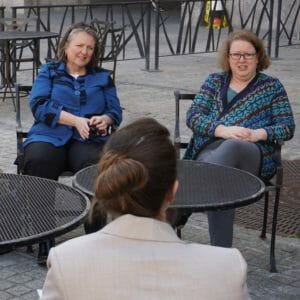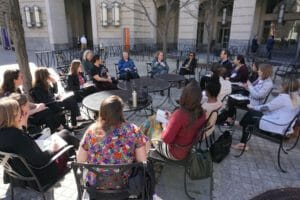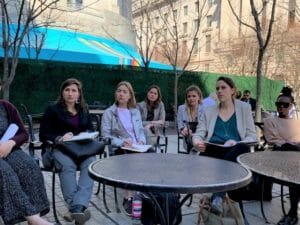This blog post was written by Arizona State University graduate student Kelly McClelland. In addition to studying Food Policy and Sustainability Leadership at ASU, Kelly is a food leader in Flint, Michigan where she works as a nutrition program manager at the Crim Fitness Foundation, oversees Flint FoodCorps members, and serves on the board of Edible Flint.
On a sunny March afternoon, the ASU Food Policy and Sustainability Leadership cohort gathered in the courtyard of the US Environmental Protection Agency Headquarters to hear from Shannon Kenny, Senior Advisor on Food Loss and Food Waste at the EPA. Kenny has worked on energy and environmental policy since she began at EPA in 1998.
In Kenny’s current work on Food Loss and Food Waste, she works together with state and local governments to coordinate research that will inform EPA recommendations to reduce the negative effects of food waste. Throughout the conversation, Kenny highlighted the importance of peer reviewed data and literature related to food waste and food loss. It is well known that 40% of food is wasted throughout all of US food production, so evidence is important to inform and support EPA recommendations to reduce food loss and waste across the country.
Kenny and her team analyze literature to inform EPA guidelines for policies and programs aimed to reduce food loss and waste. When speaking of the general findings of her team’s work so far, Kenny highlighted a great need for preventing the purchase and production of food that will not be consumed, as well as the need for innovative ideas for lessening the impact of both pre-consumer and post-consumer food waste.
Food Policy and Sustainability Leadership students shared their experiences and current efforts to reduce food waste – from school cafeteria composting education to post-harvest food technologies that extend the shelf life of fruits and vegetables. The class also discussed the common narrative that compost and anaerobic digestion are seen as the key answers to food waste, whereas the EPA’s Food Recovery Hierarchy lists Source Reduction, Feeding Hungry People, Feeding Animals, and Industrial Uses as more preferred methods of reducing food waste. Kenny’s team is constantly reviewing recommendations such as the Food Recovery Hierarchy and creating and revising programs that support food waste reduction.
Since Food Waste is a multifaceted and complex issue, Kenny’s work requires collaboration with other government agencies, including FDA and USDA. Hopefully, this collaborative work will result in future comprehensive practices and policies to reduce food loss and waste across the country.
On behalf of the entire ASU Food Policy and Sustainability Cohort, I would like to extend our sincere appreciation to Shannon Kenny for giving us the opportunity to visit and for her tireless work to protect the environment and its inhabitants.


